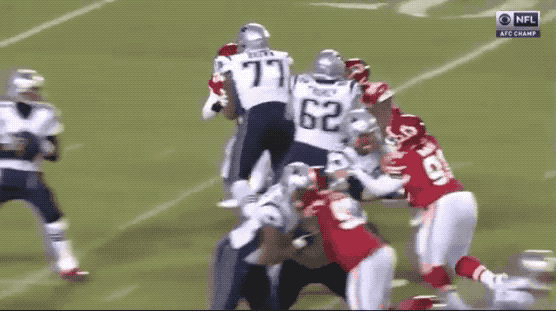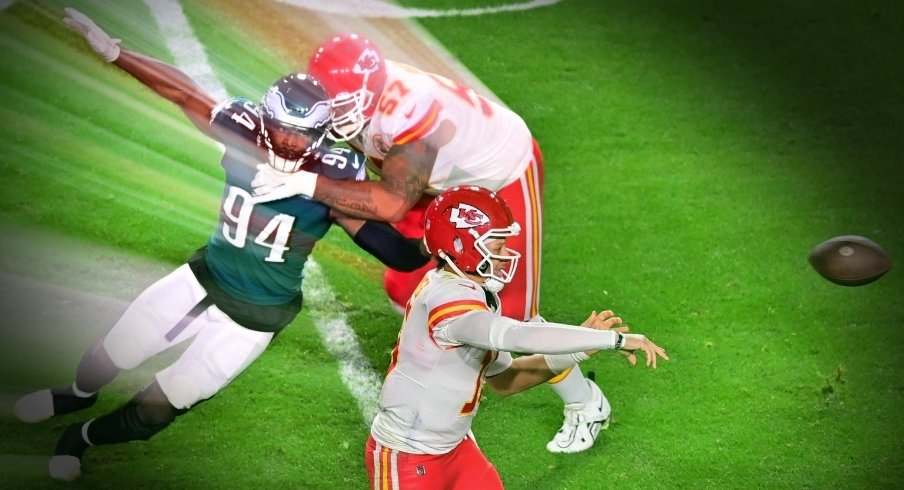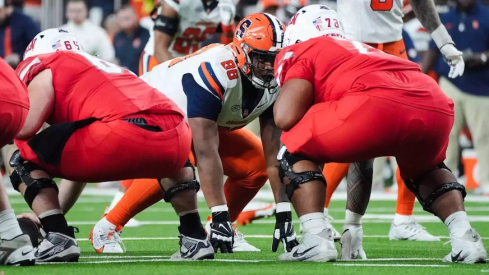This week pitchers and catchers reported to training camp ahead of what will be the final Major League Baseball season ruled by human beings.
Artificial Intelligence (A.I.) umpiring is scheduled for MLB introduction next year, which should reduce judgement errors to the irreducible minimum. The human home plate ump's job duties will shift from making snap judgments to being the fleshy representative for his robot magistrate.
This means arguing balls and strikes is headed for humanity's obsolescence dustbin, joining antiquated pastimes like "waiting in line for a phone booth" and "learning to write in cursive". Seems like progress. But progress is impossible without collateral damage.
In baseball's case, the entertaining and delicate art of pitch framing will lose all utility. Catchers may be able fool umps with twitchy gloves, but robots lack the humanity to bite on shadow zone chicanery. So pour one out for the game within the game.
Tighter umpiring should aid batters, who can now focus on swinging only at strikes with the borderline stuff off the table. As with all sports, offense is good for ratings and ticket sales. Once normalized, A.I.-ruled baseball will feel completely natural and the entire sport should benefit.
Human officials understand applying their rulebook to the letter would render games unplayable. imagine what the shoulder of every highway in America would look like if 56mph was ticketed.
As for football, I thought about how A.I. might benefit the sport on Sunday night, as human officials abruptly decided how the 2022 season would end in the waning moments of Super Bowl LVII (that's 57 in Roman numerals, which would already be in humanity's obsolescence dustbin if not for the Super Bowl).
If you missed it - and you didn't, because everyone watches the Super Bowl - the Chiefs faced a 3rd and 8 from the Eagles 15-yard line with just under two minutes remaining and the score tied at 35.
The biggest game in American sports was heading for a classic finish. I have no feelings for either franchise and did not wager on the Super Bowl this year, so I did not care who won or lost. I was simply locked into the drama.
But then Philadelphia corner James Bradberry held Kansas City receiver JuJu Smith-Schuster on his route, drawing a flag which by rule gifted the Chiefs an automatic 1st down. The four yards they gained were inconsequential; they now had four additional plays with which to waste time. The call effectively handed the title to the Chiefs.
Kansas City could now run out the clock and win the game with a chip-shot field goal, leaving Philadelphia with little-to-no time to try and answer. The flag put the Chiefs in a similar position to one the Buckeyes had late in the 2009 Fiesta Bowl, when they could have ended the game on their terms.
Fourteen years ago, the Texas defense wisely allowed Boom Herron to score a touchdown on 2nd and short, which allowed its offense to get the ball back and escape a sure loss.

The Eagles attempted to get Pat Mahomes off the field the same way by forfeiting all effort on the 1st down that followed the penalty. But running back Jerick McKinnon saw right through it and took himself down in-bounds, untouched. The Chiefs wasted a little more time and centered a field goal attempt to leave the Eagles in shambles.
Those final two minutes would have belonged to Philly's offense, as the flag was thrown on 3rd and 8. No matter what happened with Kansas City's field goal attempt, the Eagles would have 100 seconds to do anything.
That flag took all that drama off the table, which made officiating the center of attention.
This controversy cannot be dismissed as just losers whining about calls that didn't go their way - Kansas City scored on every one of its 2nd half possessions and Philly's defense chose the worst time to produce one of the worst performances in franchise history.
The infraction is not in question. Bradberry definitively held Smith-Schuster. He even admitted it in the postgame and his infraction was as obvious in real-time as in every one of the 37 different slow-motion angles a game televised like the Super Bowl can provide.
The problem is football officiating isn't conducted by a rulebook or A.I.-programmed robots. It's carried out by humans. Consider this late 4th quarter roughing the passer flag from the 2019 AFC Championship, which extended a possession for New England and indirectly cost the Chiefs a Super Bowl trip.
It's a technically correct penalty on the Chiefs. But come on.

Football judgements can be analogous to balls and strikes in conspicuous but limited doses; in-or-out of bounds, catch or no catch, fumble or no fumble. Baseball is almost entirely dichotomous - fair or foul, safe or out, ball or strike.
Its nuanced parts like wandering off the base path, balking or any other baseball minutiae only its true nerds enjoy are lost on broader audiences. They rarely decide games, and if they do - baseball plays 162 games every summer. It takes about a decade for football teams to do that.
Baseball games of real consequence are few are far between. Football refs don't have that luxury.
Their penalties are discharged subjectively, creating gameplay ranging between the refs are letting them play where everything and anything goes, down to uh oh, ref show where every single infraction that takes place is flagged or whistled, along with a few imaginary ones.
Could A.I. thread the needle and consistently call the optimal number of penalties, establishing what is and isn't permissible without deviating suddenly? See, that would be interesting.
Pulling that off without A.I. requires extraordinary officials. Alas, we're stuck with ordinary ones.
Ordinary refs - on Sunday, the best the NFL had to offer - were in charge of Super Bowl LVII, a they're letting them play classic right up until that hold on Bradberry, the first one flagged all night.
And it happened in the 58th minute not even 10 yards from Chiefs' OT Orlando Brown Jr. committing a textbook hold on Eagles' DE Josh Sweat. No, not the gratuitous, uncalled one pictured atop this column.
Here, below. You can see Smith-Schuster being held in the same frame. Don't be distracted by Chiefs OG Trey Smith (no. 65) tackling Eagles LB Haason Reddick.

A few paragraphs earlier:
It's a technically correct penalty on the Chiefs. But come on.
It would have been a ticky-tack flag, but it's a hold nonetheless - a hold the ref rightfully didn't call. Uncalled holding on just about every play is football's version of driving 62 in a 55 in front of six cops, like oh shit cops ahhhh okay cool they're not coming after me.
That's what Brown did to Sweat here, though his grabbing likely kept Mahomes from being sacked and instead produced a desperation ball so uncatchable pass interference downfield would have been waived off.
Grabs are holds. That's holding. Brown is holding. So is Bradberry. So is...everyone, often. We all like to drive 55ish in a 55 zone, and when we get ticketed it's chalked up to bad luck, or worse - bias.
Brown's hold went uncalled, along with every other qualified holding infraction on the night - including the one pictured atop this column. Neither Mahomes or Eagles QB Jalen Hurts took a true sack on the evening (Hurts was tackled for a one-yard loss twice on rushing plays).
If you were wondering which team had the NFL's top sacking defense this season you might be surprised to learn it was Philadelphia. Right behind the Eagles at no.2 in the league, the Kansas City Chiefs.
Zero sacks combined. Zero holds on linemen. That's only possible when whistles are swallowed.
The officials were letting them play into the 58th minute, when Super Bowl Ted Valentine abruptly showed up and deviated everyone's attention to the officiating crew. If advancements in A.I. could solve for these extremely human moments, perhaps it's worth a look.
Ordinary people and human referees understand applying the rulebook to the letter would render games unplayable. Just imagine what the shoulder of every highway in America would look like if going 56mph - technically, a traffic violation - was ticketed. The humans wearing stripes hold the sanctity of entertainment and competition in their hands.
Which is why that flag never should have been thrown. The 37 different slow-motion replays confirming its validity are not as relevant or damning as the previous 58 minutes of officiating. Every holding penalty is subjective, and when calls like that are made it stirs cynicism, skepticism and conspiracies. The Chiefs probably would have won anyway!
Officials let them play for just over 58 minutes. They should have let them go the full 60.



